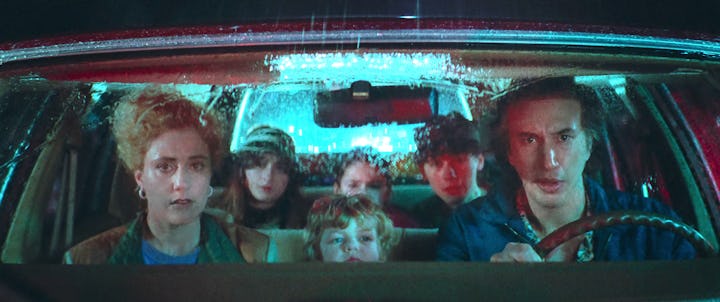37 Years Later, This “Unfilmable” Family Story Has Become A Fantastic Movie
White Noise is somehow weirder than the book. That’s why it’s great.

In 2023, Don DeLillo’s postmodern family drama White Noise feels shockingly more realistic than it did in 1985 when the book was published. Jan. 21, 2023, marks exactly 37 years since the novel was released, and it’s still amazing. From its critique of pervasive consumerism and the rise of dangerous prescription medications to its pointed attack on nostalgia, White Noise, arguably, has more to say about the events of the past two decades than it did about the 1980s. Usually, when something like this happens with a great novel, we tend to say it’s “timeless.” But, when it comes to movie adaptations, an ambitious, and multilayered text like White Noise is called something else — “unfilmable.”
But the triumph of Noah Baumbach’s new film version of White Noise is that it manages to do the impossible: turn the book back into something more surrealistic. The movie version of White Noise captures what makes the book great by, essentially, making the hyperbolic science-fiction elements of the novel more pronounced. Paradoxically, this new version of White Noise feels more like a feature-length episode of The Twilight Zone than it does a ruminative period piece. This is to its credit; this is why it works. If you’ve missed the movie — which hit Netflix at the end of 2022 — you’re basically missing the moodiest sci-fi movie in recent years, and a valiant adaptation of a great novel simultaneously. No spoilers ahead.
Calling White Noise “science fiction,” might scan as incorrect at first blush, and back in 1985, DeLillo said, “I never set out to write an apocalyptic novel.” And yet, that’s exactly what White Noise is. In fact, even if we took out the end-of-the-world feeling in the story, two specific science fictions — the fictional narcotic Dylar, and the “airborne toxic event” — cause the plot to happen. Over the years, several critics and sci-fi fans have claimed White Noise as sci-fi. And, if you compare this book to some of Kurt Vonnegut’s borderline sci-fi masterpieces, it’s easy to view White Noise as a sci-fi story, first and foremost.
The new movie version takes the sci-fi lens of the story one step further. While it’s arguable that the novel presents a kind of exaggerated version of America in the 1980s, the film’s tonal style and blatant hyperbole make everything feel like a version of the ’80s that never existed. This isn’t a kind of Black Mirror simulation of the ’80s, but rather, Baumbach seems to want us to inhabit an alternate reality ’80s, one in which our weird nostalgia for various historical and pop culture phenomena is cranked up even further than is reasonably possible. We’re not meant to feel good about the obsession with Elvis, Hitler, or sugar-free gum, but we’re also concerned that the people in this version of reality do. Without spoiling the plot of the movie or the book too much, let’s just say the nostalgia critique in White Noise is connected to the consumerism critique, which all allows the science-fiction plot stuff to happen.
What makes White Noise a compelling, and, occasionally, darkly funny film, is the fact that all of this over-the-top world-building is handled subtly, yet clearly. Adam Driver and Greta Gerwing disappear into their roles as Babette and Jack. Ditto Don Cheadle as Professor Murray. And yet, nobody would ever say these characters are remotely realistic or naturalistic.
Adam Driver, Greta Gerwig, and Don Cheadle in White Noise.
Early in the film Babette asks “when do we know when this is real?” She’s referring to how much the family should worry about the impending danger of the “airborne toxic event.” Real families can relate. Jack’s dismissal, at first, of the shift in the status quo, is scarily realistic. How many dads among us harbor a similar knee-jerk reaction to say “everything’s fine,” out of fear? Driver channels this sort of arrogant but well-meaning dad-flaw, but because of the context, it feels like he’s brushing away the impending invasion of aliens, not a major public health crisis.
White Noise turns our fears of all of these things — from the corruption in pharmaceuticals to the delicate bubble of our day-to-day lives — and throws it all into a funhouse mirror. Because of the multilayered nature of the novel, you can easily see a world in which Baumbach turned this into a three-hour epic. But it’s not. White Noise is just over two hours and uses every minute brilliantly. It’s not a fast-paced film at all, but by the time it’s over, you can’t believe just how much happened. It’s a movie that is both introspective and massive. It has something to say about the world in which we live, but, strangely, lets you escape for a while, too. The brand of misery in White Noise may seem familiar, but the presentation is unique. Sometimes you’re watching a horror film. Other times, you’re just watching a quirky Noah Baumbach movie. And throughout it all, you’re seeing a wonderful book come to life, one that you’ll surely want to revisit once the credits roll.
White Noise is streaming now on Netflix.
This article was originally published on